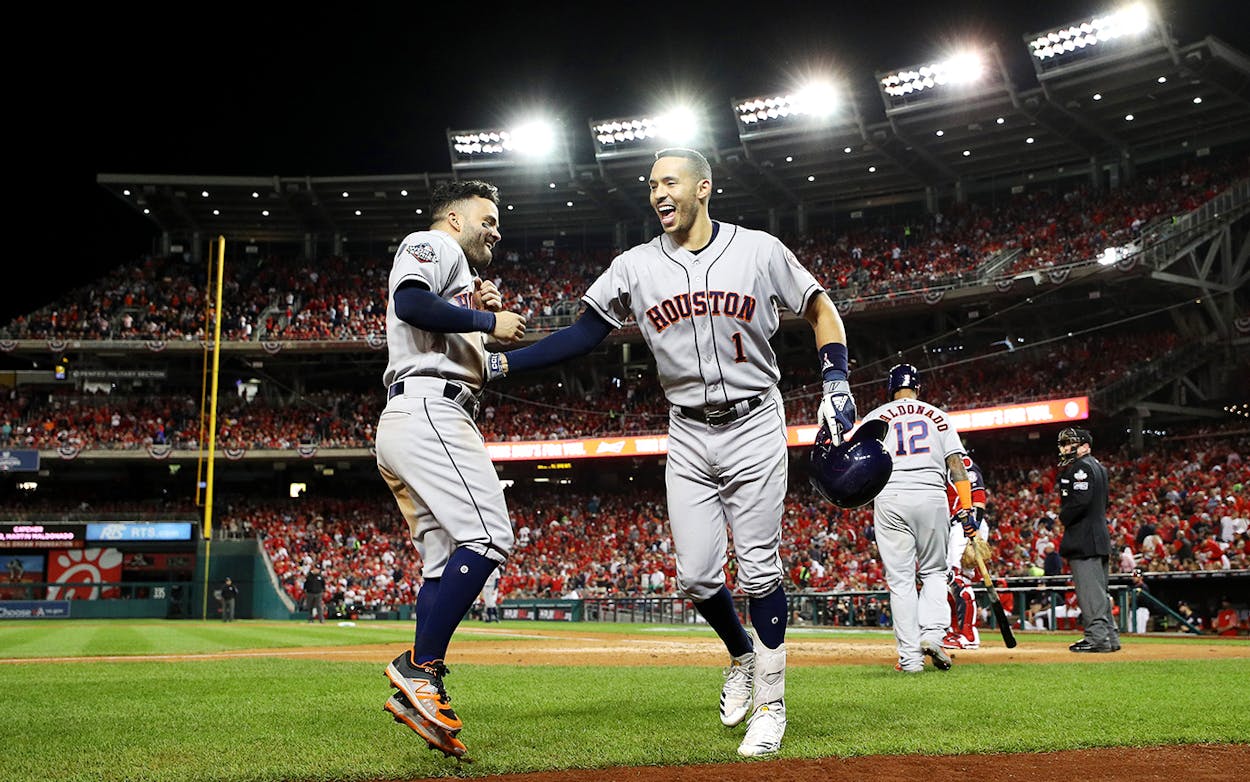It’s been heavier than usual to root for the Astros this World Series. The team got off to an 0-2 start in Houston, following an error from the front office that served up a huge distraction: A Sports Illustrated story described how now-former assistant general manager Brandon Taubman taunted reporters in the clubhouse after the team clinched the pennant, shouting about how great it was that accused domestic abuser Roberto Osuna was on the roster.
After the team lost the first two games, fans were livid—and the easily identifiable distraction hanging over the club gave them a place to direct their anger. The hashtag #TaubmanCurse soon began trending on Twitter. The PR disaster might not have been directly responsible for eight-time All-Star pitcher Justin Verlander giving up the home run to Kurt Suzuki that opened the floodgates for the blowout loss in game two. Regardless, it was a bad look for a team that entered the series with high expectations. And following the team’s two home losses, management fired Taubman.
It’s impossible to know if the team—which initially backed Taubman, accused the Sports Illustrated writer who initially reported on the incident as attempting to “fabricate” a story, and wouldn’t budge even though other media confirmed that they, too, had seen the assistant GM’s outburst—would have fired Taubman so quickly if fans weren’t looking for someone to blame for the team’s rocky start to the series. But either way, they did. And if there was a curse, it seems to have lifted. By the time the series moved to Washington D.C., the Astros went about digging themselves out of the 0-2 hole they were in—and it worked. Now, the series moves back to Houston, where the team currently holds a 3-2 lead, and is one win away from clinching the World Series.
It’s easier for many fans to root for the Astros without Taubman around—and after team owner Jim Crane finally, after nearly a week, properly apologized for how the team handled the entire affair. But the situation also reveals an identity shift in being a Houston sports fan.
Houstonians have always been underdogs in sports—even the Rockets’ two-year run in the nineties has long been perceived as less about inevitability and more about the team filling a void left by Michael Jordan’s brief dalliance in baseball—and yet they entered this series playing Goliath to the Nationals’ David. The Astros, after all, were the team that had been here before. They were the betting favorite, the team with the hype and swagger. And while Houston sports fans identify with being feisty underdogs, it’s the Nationals who scraped their way into the playoffs as a wild card team. Astros fans entered this series cheering for Apollo Creed, not Rocky—and the fact that the men in the front office were so prominent in the first week of the series only underscored that the Astros have transitioned out of being the scrappy upstart Houston sports fans are so keen to cheer on.
That transition is happening all throughout sports right now—but Houston throws it in the sharpest possible relief. We live in a “trust the process” era, where fans are encouraged to cheer for the front office execs building the roster as much as for the players on the field. The Astros have been one of the poster teams for this mindset (a 2014 Sports Illustrated cover touting the team’s ethos actually appeared on posters), so it wasn’t a surprise that when “trusting the process” had just led the team to the World Series, the organization initially backed Taubman. But once the team started dropping the most important games of its season, that blind faith seemed to be in shorter supply.
Rooting for a front office encourages fans to treat players as stat sheets and business decisions, rather than as the figures who define the game. It encourages them, as Louisa Thomas wrote at the New Yorker last week, to view José Altuve as worthy of investment not because he was the beating heart of the team, but because he “wasn’t meeting the ball far enough out in front.” It encourages them to look at Roberto Osuna and, rather than see someone accused of assaulting the mother of his child, see only an incredible spin rate on a four-seam fastball.
But trusting the process isn’t the actual fun of sports, and the team’s remarkable comeback in this series reminds us what is: We want to see people do amazing things under adversity. It’s why this World Series can sweep up even the fans who were disappointed with the organization’s handling of the Taubman affair. Getting off to an 0-2 start isn’t just about breaking a curse that felt very real last week—it’s about giving the players the chance to show off their hearts. It’s about Alex Bregman driving in 7 RBIs despite a dismal .182 batting average, about the homers in back-to-back games from journeyman catcher Robinson Chirinos, about unheralded rotation pitcher Jose Urquidy throwing five nigh-flawless innings to bring the series even in Game 4, about rookie Yordan Alvarez rediscovering his swing just in time for the Astros to take a series lead in Game 5.
The front office built the roster, but it’s the players who build the stories we attach to the game. Whether the Astros bring it home or the Nationals complete the Rocky movie they’ve been playing out all season by defeating the Astros in Game 7, baseball fans will have followed a story worth remembering.
- More About:
- Sports








